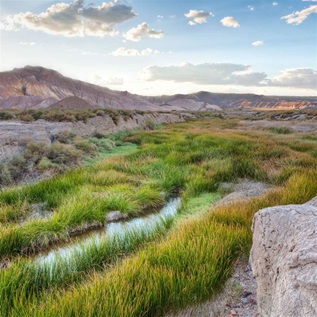Oceans: Our Finite, Fragile and Valuable Resources
Two years ago, President Bush set a new standard for global ocean protection when he created the world's largest no-take marine protected area in the Northwestern Hawaiian Islands. Earlier this week, the White House announced another group of sites in U.S. waters that will be assessed for possible protection as marine monuments or sanctuaries.
While the president's announcement is a hopeful sign for ocean conservation, monument or sanctuary designation alone does not necessarily convey a high degree of protection, and could allow a host of activities including commercial and recreational fishing, and deep sea mining, among others. However, if the president establishes these new sites as no-take reserves, where no extractive activity is allowed, it would be one of the most significant environmental achievements of any U.S. president.
Included in the president's list of potential underwater reserves is an Arizona-sized section of ocean near the famed Mariana Trench in the Western Pacific. As the deepest canyon on earth, the almost 36,000-foot deep Mariana Trench could swallow Mt. Everest with room to spare. It is also home to an array of rare, exotic underwater mud volcanoes and some of the most unusual deep sea creatures on Earth.
Another proposed site is Rose Atoll off American Samoa in the Pacific Ocean, which is a nesting area for the threatened green sea turtle and home to the rare giant clam. The final site, holding five times as many coral species as are found in the Florida Keys, is an area surrounding the Central Pacific islands of Palmyra, Kingman, Johnston, Jarvis, Howland, Wake and Baker.
The White House announcement gave no hint of the level of protection that is being contemplated for these sites. If the president bows to the inevitable pressure he will get from industry interests, and leaves these areas open to activity that could well damage these unique and relatively pristine places, he will miss a historic opportunity. On the other hand, if he designates these sites as no-take marine reserves, and provides adequate resources for their management, he will leave a legacy of ocean parks akin to that of Theodore Roosevelt, who created some of America's most beloved parks on land.
So why does this matter? It matters because the world's oceans are critical to the health of the global environment but are rapidly deteriorating. For far too many years, we have ignored the warnings that overfishing, pollution and the excessive development of coastal areas are taking a serious toll on the health of our oceans, which help to regulate our climate, generate much of the air we breathe and detoxify and recycle pollutants. Oceans, and the life they contain, support millions of jobs and provide a significant amount of needed protein to people and animals throughout the world, in addition to being a source of enjoyment and beauty to us all. In short, they help to nourish and sustain life on Earth.
Compared to land, a remarkably small percentage (less than one-tenth of 1 percent) of the world's ocean waters are protected from destructive activity in the form of no-take marine reserves. While such reserves are certainly not a panacea for solving all of the problems that plague our marine environment, science has demonstrated that they are an invaluable tool in protecting diverse oceanic habitats.
Properly created, protected, managed and funded, marine reserves are highly effective ways to reinvigorate our oceans in ways that can benefit all stakeholders. They generate tourism, increase the abundance of fish and other marine life, help us better understand how healthy marine ecosystems function and assist in protecting heretofore undiscovered species of marine life that can benefit humankind in numerous ways.
The establishment in 2006 of the world's largest marine reserve in the Northwestern Hawaiian Islands was a remarkable step forward for global ocean conservation. The president now has the opportunity to expand that legacy by fully protecting some of the largest and most pristine areas left in U.S. waters. But these sites must be protected in substance as well as in form.
If he does that, George W. Bush will have protected more of the world's oceans in the form of reserves than any other person in history, and will have led the nation into a new era of ocean conservation by signaling the need to begin treating our oceans as the finite, fragile and valuable resources they are, both for the nation and the world.











